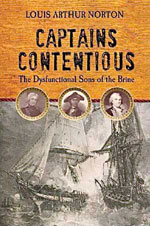 Louis Arthur Norton’s book Captains Contentious – The Dysfunctional Sons of the Brine is an entertaining reminder that history is finally about individuals, dedicated to the causes in which they believe, as well as serving their own needs and obsessions.
Louis Arthur Norton’s book Captains Contentious – The Dysfunctional Sons of the Brine is an entertaining reminder that history is finally about individuals, dedicated to the causes in which they believe, as well as serving their own needs and obsessions.
Norton looks at five ship’s captains who fought for the infant American Navy in the Revolutionary War. When not fighting the British, these captains also fought with each other, with their crews, their peers and with politicians ashore. Their personal quirks and flaws, in turn, hindered their careers and helped shape their victories. Norton examines the exploits of John Manley, Silas Talbot, Dudley Saltonstall, Joshua Barney and John Paul Jones. Each is a fascinating study in the character of these courageous if often flawed naval commanders.
My one complaint with Captains Contentious is that I wanted more. At 146 pages before the notes and index, it whet my appetite, but left me hungry. The book is in some respects very similar in focus and approach to Gordon Wood’s recent book, Revolutionary Characters, where Woods looks at the psychological make up of nine of the “Founding Fathers.” Because Norton only considers five naval commanders, I found myself asking, “but what of Whipple? Or Lambert Wickes or John Rathbun or Nicholas Biddle?” There was such a fascinating group of ship’s captains during the Revolution, ranging from inept and cowardly to gifted and fearless, that it seems a shame to stop at five.
A lesser concern I had about the book, which may be related to why Norton stuck to the five commanders that he chose, is the question of just how “contentious” these captains really were. It may be that Abraham Whipple, Lambert Wickes or John Rathbun were not included because they were not quite contentious enough to fit the model.
Perhaps a corollary to that question might be – were they any more contentious than any other military leaders of the day, on land or sea? Captain John Manly, the least contentious of Nelson’s captains, resigned his commission when he did not receive the ship he wanted. This was little different that the action taken by John Stark, whose blocking of Howe’s attempt to flank the American defenses on Breed’s Hill saved the battle from being a rout, then turned around and went home to his New Hampshire farm when others who he deemed less worthy were promoted over him. Ironically, because Stark had resigned his Colonial commission, he was in the perfect position to lead the militia which defeated the Hessians at Bennington, which prevented Burgoyne’s resupply and blocked his one escape route, which was critical to his subsequent defeat at Saratoga.
These quibbles aside, Louis Arthur Norton’s book Captains Contentious – The Dysfunctional Sons of the Brine is fascinating, well written and shines a light on a remarkable group of captains too often overlooked by history.
